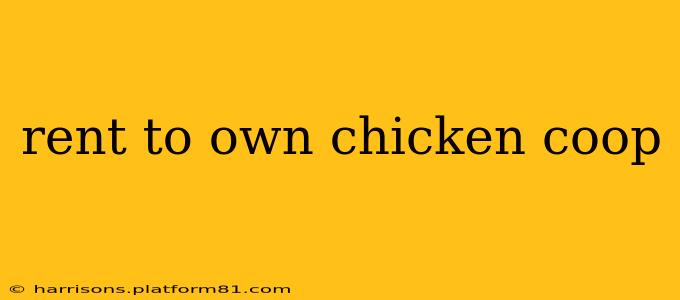Raising chickens can be a rewarding experience, providing fresh eggs and a connection to nature. However, the initial investment in a chicken coop can be a significant hurdle for many aspiring backyard farmers. That's where rent-to-own options come into play, offering a more accessible pathway to chicken ownership. This guide explores the world of rent-to-own chicken coops, outlining the benefits, drawbacks, and things to consider before embarking on this journey.
What is a Rent-to-Own Chicken Coop?
A rent-to-own chicken coop arrangement typically involves paying a monthly fee for the use of a coop, with a portion of each payment applied towards the eventual purchase price. This differs from a traditional rental, where you pay only for the use of the coop and don't own it. The specifics of the agreement, including the monthly payments, the total purchase price, and the length of the rental period, will vary depending on the provider. Some providers might offer different coop models and sizes, allowing for customization based on your needs and flock size.
How Does a Rent-to-Own Program Work?
Rent-to-own programs for chicken coops are not as prevalent as similar programs for other goods, like cars or appliances. You're more likely to find this option through smaller, local businesses specializing in poultry supplies or perhaps from private individuals selling or leasing pre-owned coops. The process usually involves:
-
Finding a Provider: Search for local businesses or individuals offering rent-to-own options. Online classifieds, local farmers' markets, and agricultural supply stores are potential starting points.
-
Agreement: Negotiate the terms of the agreement, including the monthly payment, the total purchase price, the duration of the rental period, and any maintenance responsibilities. Be sure to get everything in writing!
-
Payments: Make regular monthly payments as agreed upon. Ensure you understand how much of each payment goes toward the purchase price and how much is for the rental.
-
Ownership: Once the agreed-upon payment schedule is complete, you will own the chicken coop.
What are the Benefits of Renting to Own a Chicken Coop?
-
Affordability: Rent-to-own offers a more manageable financial commitment compared to buying a coop outright. The monthly payments can be easier to budget for than a large upfront expense.
-
Accessibility: This option makes chicken ownership accessible to individuals who may not have the immediate funds to purchase a coop.
-
Trial Period: It provides a trial period to ensure the coop meets your needs and your chickens thrive before committing to full ownership.
-
Reduced Risk: If you decide chicken keeping isn't for you, you can potentially exit the agreement without the large financial loss of purchasing a coop you no longer need.
What are the Drawbacks of Renting to Own a Chicken Coop?
-
Higher Overall Cost: In the long run, you'll likely end up paying more for the coop than if you bought it outright. The added interest or rental component makes the final price higher.
-
Limited Selection: The available coops through a rent-to-own program might be more limited than what you'd find when buying directly from a manufacturer or retailer.
-
Contractual Obligations: You're bound by the terms of the contract, which could have penalties for late or missed payments.
-
Difficulty Finding Programs: Rent-to-own options for chicken coops are not widely available, requiring more effort in finding a suitable provider.
Where Can I Find Rent-to-Own Chicken Coops?
Finding a rent-to-own chicken coop program requires some legwork. Start your search locally:
-
Online Classifieds: Check sites like Craigslist, Facebook Marketplace, and other local classifieds.
-
Local Farmers' Markets: Visit local farmers' markets and talk to vendors who sell chicken supplies. They may know of someone offering rent-to-own options.
-
Agricultural Supply Stores: Inquire at agricultural supply stores in your area. They may be able to connect you with someone offering rent-to-own.
-
Poultry Associations: Contact your local poultry association or clubs; members might have insights into local options.
What Should I Look for in a Rent-to-Own Agreement?
Carefully review any rent-to-own agreement before signing. Pay close attention to:
-
Monthly Payment Amount: Ensure the payments are affordable within your budget.
-
Total Purchase Price: Understand the overall cost of the coop after all payments are made.
-
Duration of the Agreement: Know the length of the rental period before you own the coop.
-
Maintenance Responsibilities: Clearly define who is responsible for maintaining the coop during the rental period.
-
Early Termination Clause: Understand the terms and conditions if you need to terminate the agreement early.
-
Late Payment Penalties: Be aware of any penalties for late payments.
By carefully considering the pros and cons and thoroughly researching available options, you can determine if a rent-to-own chicken coop is the right choice for you. Remember to prioritize finding a reputable provider and securing a fair and transparent agreement.
